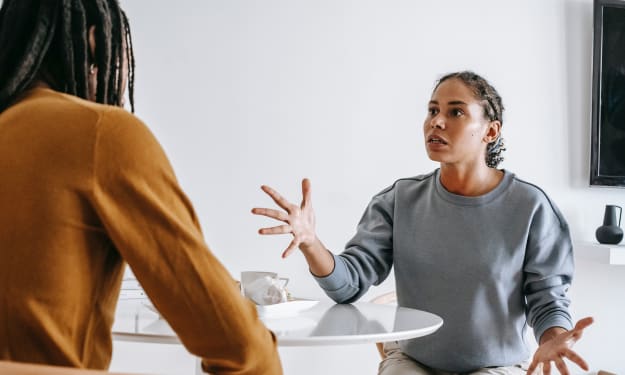
The One landed on Netflix some time ago and it’s quickly turned up in my recommendations list because of its popularity. A TV show about a dating app that can find your perfect mate based on your DNA?
Obviously, everyone loves that.
One simple click separated me from the hype. And boy, did I click. The rest is history.
Your perfect match exists
The basic premise of the app is that you don’t have to stumble through life trying to look for perfect love anymore because it’s right there in front of you — and supported by science.
What’s more, it actually works. The moment you meet your match, both of you instantly fall in love. You feel like you’ve already met before, maybe in another life, and there’s this strange feeling of familiarity and strong attraction.
Once you’re on the app and the database finds your one and only match, you’re guaranteed to fall in love. Isn’t that amazing?
Well, ask all the people whose marriages and long-term relationships fell apart because one of them went on the app and found a match.
The moment you know there’s a possibility to find true love, what you already have doesn’t seem to be good enough. Why would you be with someone who you’re already in love with and who makes you happy when you can be with the one true love? Why would you have it good when you can have it better?
For many people, it’s a no-brainer really.
And that makes me wonder about our constant hunt for perfection, our infinite lust after something just a tiny bit better. The human condition is such that we never seem to have enough — the moment something new, exciting and promising appears, we snatch at it.
The reason why The One works so great is that people want to believe they can achieve perfection, they can have it all, they can easily meet their destined soulmate and be done with it. No extra work involved.
And that’s problematic.
Is the match so perfect after all?
“Hey, I’m watching an interesting TV show…” I struck up a conversation with my long-distance boyfriend. A discussion followed:
“Would you leave me for someone with whom you’d be more compatible than me? Would you leave me for your perfect match?” he asked.
I’d lie to you if I said I didn’t find the idea intriguing. As much as I love my boyfriend and our relationship, there are obviously issues sometimes — and the app promises to give me true love, which could theoretically grant me even greater happiness.
The thing is, though, it still doesn’t rid you of issues themselves. “It guarantees you’ll fall in love,” I said. “It doesn’t guarantee that your relationship will actually work.”
And that’s the main problem. Once you tell people you’ll find them a biologically perfect mate, they hold onto that idea, convinced that no matter how horrible their DNA match can be, they are the one.
Once you fall for the idea, there’s no coming back — you’re opening yourself up for being in love with a drug addict, a violent person sitting in jail, someone from the other side of the world with a completely different culture and upbringing to your own which might not work in the long-run as both of you refuse to move, a pathological liar or maybe just someone who you have literally nothing to talk about with.
You have mind-blowing sex. You feel like you’ve already met, like there’s this strange connection between you because the chemistry is so strong. You can’t stop thinking about them. You experience all the symptoms of a honeymoon phase — but if you’re not a match emotionally, intellectually and spiritually, what happens then? What happens after six months, six years?
If your relationship isn’t working, do you just stick it out because an app told you you’re biologically the perfect fit? Or do you realise you’ve thrown away a beautiful imperfect bond with someone who loved you for the promise of a lie?
When you look at it from this angle, the matching doesn’t sound so intriguing anymore. It sounds scary more than anything — the guaranteed flood of hormones and the promise of the idea of perfection can tie you to someone who might make your legs tremble but who might also make you deeply miserable.
“Personally, I think there’s virtue in overcoming differences and making an imperfect relationship work,” my boyfriend said. “Plus, other people are not Kate! I love you and I don’t want anyone else. Someone else isn’t you.”
We are already in love and our relationship already works. It seems absurd to throw it away for a promise of something that might never be achieved.
The app promises you don’t have to work for your happiness
The reason it becomes such a big boon is that people hate to work for their happiness. Many of us just wait for it to happen somehow while complaining that it’s taking so long. As if happiness just fell into your lap from an apple tree.
My relationship works not only because we’re strongly attracted to each other, but because we share values, outlooks, worldviews and energies that connect us — and at the same time, there’s enough space where differences emerge as we try to navigate through our faults and imperfections.
It works because we communicate clearly and openly, because we treat each other with kindness and respect, because we apologise and because we’re constantly working on our own self-improvement as well as the relationship itself.
We didn’t just fall in love and ended up being happy forever. Happily married couples know this more than anyone. The work you have to put into making a relationship or a marriage work is immense.
Of course, the better the fit the less you have to keep overcoming obstacles and differences, but establishing someone as a “perfect fit” based on hormones is far from the reality of things.
A perfect fit isn’t someone you want to shag all day long. It’s someone who makes you more happy than sad, someone you can trust, someone to rely on, someone who has the same approach to relationships as you do. It’s someone who has been tested by time and experience so you can now be sure you want to spend your life with them.
And it’s usually someone you want to shag — if not all day long, at least a few times a week.
Love isn’t perfect — let’s stop idealising it
Falling in love doesn’t guarantee you long-lasting happiness.
While the buzz you feel at the beginning of a relationship is based on hormones and chemistry, making it work through ups and downs is grounded in social and psychological aspects more than anything (hormones still play a role, of course, but they’re not everything).
It’s about who you are as a person and how much you’re willing to work for happiness that counts the most. What’s more, idealising love and making it sound all-so-easy doesn’t help anyone — it sets us up for disappointment later on.
Love is messy, love is hard. No matter how much you want to rip each other’s clothes off, you still do have to accept that it’s not going to be a perfect fairy tale story. You still do have to learn to be a better person, forgive, not hold grudges, establish boundaries and more.
True love does exist — but it’s the healthy love you choose and work for, not the random love someone else pinpoints for you based on how much you influence each other’s hormones.






Comments
There are no comments for this story
Be the first to respond and start the conversation.